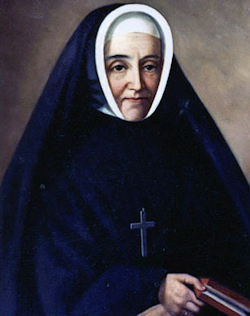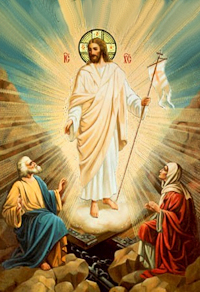Easter: April 18th
Monday of the Fourth Week of Easter
Other Commemorations: Bl. Marie-Anne Blondin, Virgin (RM; Optional Memorial in CAN)
» Enjoy our Liturgical Seasons series of e-books!
So Jesus spoke to them again: "I tell you most solemnly, I am the gate of the sheepfold. All others who have come are thieves and brigands; but the sheep took no notice of them. I am the gate. Anyone who enters through me will be safe: he will go freely in and out and be sure of finding pasture. The thief comes only to steal and kill and destroy. I have come so that they may have life and have it to the full."
Holy Ghost, Who governest the Church, have mercy on us. Litany of the Holy Spirit for the election of a holy pope.
Meditation
Two great achievements, which include many others, were necessary to make us Christians. The first was to break and destroy the unhappy and detestable alliance we had contracted by sin, with Satan, whose slaves, children and members we had become. The second was to reconcile us with God, whose enemies we were, and establish us in a new alliance with Him, nobler and more intimate than the bond we enjoyed before sin. To accomplish those two things, it was necessary to blot out our sins, to deliver us from the power of Satan, to purify and cleanse our souls from the guilt of their crimes, and clothe them with the graces and gifts befitting the title of children of God and members of the Son of God.
Here is what the Eternal Father accomplished for this purpose. He sent His Only Beloved Son, His Heart, His love, His delight, His treasure, His glory, and His life. He sent Him, I say, and gave Him. But where, to whom and why did He send and give Him?
- He sent Him into this world, to this land of misery and malediction, a place of darkness, horror, sin and tribulation.
- He gave His Divine Son to us, that is, to His enemies, to ingrates and perfidious creatures.... By giving His Divine Son to us, He delivered Him up to the torments and death of the Cross. "God so loved the world, as to give his only begotten Son" (John 3, i6).
- Why did He send and give His Only Son in this way? To deliver us from the tyranny of sin and the devil; to wash our souls in His Precious Blood, to adorn us with His sanctifying grace; to be our redemption, our reparation, our purification, our justification, our sanctification, and to raise us from the horrible position of slaves, children and members of Satan, to the admirable dignity of friends and children of God, brothers and members of Jesus Christ. "O ineffable goodness!" exclaims St. Augustine. "O incomparable mercy! We were not worthy to be slaves of God, and lo! we are numbered among His children!" O Good and Amiable Father, what shall we render to Thee for the infinite gift Thou hast bestowed upon us, in giving us that which Thou dost hold most dear and precious, Thy Only Son? We offer Thee Thy same Dearly Beloved Son in thanksgiving, and in union with our obligation, we offer, give, consecrate and sacrifice ourselves to Thee wholly and irrevocably. Take us and possess us perfectly and forever.
Bl. Marie-Anne Blondin
 Esther Blondin was born on April 18, 1809 to a Catholic farm family in a rural community in Quebec, Canada. Her mother taught her to worship at the Eucharist and recognize Divine Providence. Her father taught her to have a strong faith and to be patient in times of suffering.
Esther Blondin was born on April 18, 1809 to a Catholic farm family in a rural community in Quebec, Canada. Her mother taught her to worship at the Eucharist and recognize Divine Providence. Her father taught her to have a strong faith and to be patient in times of suffering.
As a young woman, Esther worked as a domestic in her village to help her family. Drawn to vowed religious life, she joined the Congregation of the Sisters of Notre Dame. Illiterate, she learned to read and to write at age 22 as she went about the work of the Sisters. Ill health forced her to give up her dream of becoming a Sister of the Congregation of Notre Dame. After a time of rest, she was Esther became a teacher and then the principal of the school. Later she would train young teachers who taught in small country schools.
Healthy and mature, in 1850, Esther, with permission from the local Bishop, founded the Congregation of the Sisters of St. Anne and became the first Mother Superior, taking the name Marie-Anne.
In the following years, the congregation grew and expanded throughout Canada and the US New England states. And while the Congregation attracted more women seeking vowed religious life, the Foundress faced internal discord with the new chaplain assigned by the Church to oversee the group. She wrote, “As for me, my Lord, I bless Divine Providence a thousand times for the maternal care she shows me in making me walk the way of tribulations and crosses.” (Vatican document)
The foundress was deposed and relegated to the position of laundress, a position she accepted in order to minimize friction and distractions, helping to ensure the further development of the congregation. As is the way when one has trust in Divine Providence, Sister Marie-Anne was now able to personally teach the novices as they worked alongside of her.
One novice, surprised to learn that this simple woman was the foundress of the Sisters of St. Anne asked her why she, the foundress, was doing laundry. Her response:
“The deeper a tree sinks its roots into the soil, the greater its chances of growing, branching out, and bearing fruit.”
She also taught through her life and actions that “There is more happiness in forgiving than in revenge.”
On her deathbed, Sister Marie-Anne said to her sisters, “May Holy Eucharist and perfect abandonment to God’s will be your heaven on earth”. She went home to her “Good God” on January 2, 1890.
Sister Marie-Anne’s example of humility, obedience, forgiveness, and non-violence continue to speak to us today. We continue her mission to those whom God has put in our path, regardless of where the path is located.
In 2001, she was beatified by Pope St. John Paul II.
—Taken from Sisters of St. Anne
Highlights and Things to Do:
- Read more about Blessed Marie-Anne:
- Find out more about the Sisters of St. Anne which she founded.
- Listen to the CatholicSaints.info podcast about Bl. Marie-Anne.
- Read a short History of Her Cause






